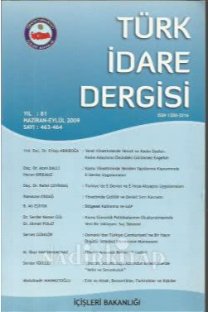İYİ YÖNETİŞİM İLKELERİ ÜZERİNE BİR ELEŞTİRİ VE KÜRESEL İYİ YÖNETİŞİM İLKELERİ ÜZERİNE BİR ÖNERİ
20. yüzyılın yaklaşık son on yılından bu yana yönetim bilimi açısından elealınagelmekte olan temel kavramlardan biri kuşkusuz yönetişimdir. Yönetişimkavramı, birçok perspektif tarafından ele alınması dolayısıyla her geçen günakademik manada değişmekte, gelişmekte ve yeni formlar kazanmaktadır.Yönetişim kavramının birçok yönetsel odak tarafından yönetim paradigmasıolarak tercih edilen formu ise ‘iyi yönetişim’dir. Bu çalışmada tartışılacak olan esasnokta, küreselleşme olgusunun da artan etkisiyle ‘iyi yönetişim’in uygulanabilirbir yapıda olup olmadığıdır. Yani 21. yüzyıl şartlarında bir yönetim, iyi yönetişimilkelerinin tümünü aynı anda uygulayabilir mi? İyi yönetişim ilkeleri etrafındaşekillenen bir yönetim, küreselleşme şartlarında mümkün müdür? Bu tartışma,ilkeler arası çelişkiyi en görünür kılan ilke eşleştirmeleriyle yürütülmüş ve aynızamanda ‘küresel iyi yönetişim’ ilkeleri önerilmeye çalışılmıştır
A CRITICISM ON GOOD GOVERNANCE PRINCIPLES AND A SUGGESTION ON GLOBAL GOOD GOVERNANCE PRINCIPLES
One of the basic concepts that have been discussed in terms of management science since the last decade of the 20th century is undoubtedly governance. The concept of governance is changing and developing and gaining new forms in academic sense as it is handled by many perspectives. The preferred form of governance as a management paradigm by many managerial focuses is ‘good governance’. The main point to be discussed in this study is whether ‘good governance da is feasible with the increasing impact of the phenomenon of globalization. In other words, can a government in the 21st century apply all the principles of good governance at the same time? Is it possible under the conditions of globalization, a management shaped around the principles of good governance? This discussion has been carried out with principle matching, which makes the conflict between the principles most visible, and also tried to propose the principles of ‘global good governance’.
___
Akhmouch, A. (2012), ‘’Good Governance; Synthesis Report for the Condition for Success 1’’, 6th WWF CS1 Core Group Coordinate Administrator of the OECD Water Governance Programme.Brand, U. (2005),’’Order and Regulation: Global Governance as a Hegemonic Discourse of İnternational Politics?’’, Review of International Political Economy. 12(1), 155–176.
Butler, E. (2016), Özgür Toplumun Temelleri, (Çev: Hakan Şahin), Ankara: Liberte Yayınları.
Fayol, H. (2016), Genel ve Endüstriyel Yönetim, (Çev. M. Asım Çolakoğlu), Ankara: Adres Yayınları.
Fukuyama, F. (2013), “What Is Governance?”, CGD Working Paper 314, Washington, DC: Center for Global Development, https://www.cgdev.org/sites/ default/files/1426906_file_Fukuyama_What_Is_Governance.pdf. erişim tarihi: 09.01.2020.
G20/OECD. (2015), Principles of Corporate Governance; OECD Report to G20 Finance Ministersand Central Bank Governors, http://g20.org.tr/wp-content/ uploads/2015/11/G20-OECD-Principles-of-Corporate-Governance.pdf, erişim tarihi: 09.01.2020.
https://www.unescap.org/sites/default/files/good-governance.pdf, erişim tarihi: 09.01.2020
http://www.tdk.gov. tr/index. php? option = com_ gts & kelime =Y%C3%96NET%C4%B0%C5%9E%C4%B0M, erişim tarihi: 09.01.2020.
Kaufmann, D.,Kraay, A. ve Mastruzzi, M. (2009),’’Governance Matters VIII: Aggregate and Individual Governance Indicators 1996–2008’’, The World Bank Development Research Group Macroeconomics and Growth Team.
Marcus Aurelius. (2019), Düşünceler, (Çev: Şadan Karadeniz), İstanbul: Yapı Kredi Yayınları.
Merry, S. E. (2011), ‘’Measuring the World Indicators, Human Rights, and Global Governance’’, Current Anthropology, 52(3), 83-95.
Nizamü’l Mülk. (1990), Siyasetname, (Haz. Mehmet Altay Köymen), İstanbul: Kültür Bakanlığı Yayınları.
Ogundiya, S.I. (2010), ‘’Democracy and Good Governance: Nigeria’s Dilemma’’, African Journal of Political Science and International Relations, 4(6), 201-208.
Özer, M.A. (2015), Yeni Kamu Yönetimi, Ankara: Gazi Kitabevi.
Özer, M.A ve Önen, S.M. (2017), 200 Soruda Yönetim Kamu Yönetimi, Ankara: Gazi Kitabevi.
Rodrik, D. (2008), ‘’Thinking about Governance. İçinde; Governance, Growth, and Development Decision-making’’, Washington. D.C., The International Bank for Reconstructionand Development/The World Bank, 17-24.
Spencer, H. (2016), Devlete Karşı İnsan, (Çev. Yavuz Selim Altındal), İstanbul: Litera Yayıncılık.
Taylor, D. (2007), Şeffaf Lider, (Çev. Selim Yeniçeri ve Arlene Yeniçeri), İstanbul: Dinazor Yayınları.
Taylor, F.W. (2016), Bilimsel Yönetimin İlkeleri, (Çev. Bahadır Akın), Ankara: Adres Yayınları.
Toksöz, F. (2008), İyi Yönetişimin El Kitabı, İstanbul: Tesev Yayınları.
UN. (1996), ”Reports Of The United Nations Conference on Human Settlements (HABITAT II.)’’, The Habitat Agenda Goals and Principles, Commitments and the Global Plan of Action https://www.un.org/en/events/pastevents/pdfs/habitat_ agenda.pdf, erişim tarihi: 09.01.2020
UN. (2014), “Preparatory Committee for the United Nations Conference on Housing and Sustainable Urban Development (Habitat III.)’’, New York.
UNDP. (2007), “Governance Indicators-A User’s Guide”, New York, https://www. un.org/ruleoflaw/files/Governance%20Indicators_A%20Users%20Guide.pdf, erişim tarihi: 09.01.2020
UNDP. (2011), “Governance Principles, Institutional Capacity and Quality”, New York, 268-294, https://www.undp.org/content/dam/undp/library/Poverty%20 Reduction/Inclusive%20development/Towards%20Human%20Resilience/ Towards_SustainingMDGProgress_Ch8.pdf, erişim tarihi: 09.01.2020
Weber, M. (2017), Bürokrasi ve Otorite, (Çev. Bahadır Akın), Ankara: Adres Yayınları.
Wilson, W. (1961), İdarenin İncelenmesi, İçinde; ‘’Woodrow Wilson Seçme Parçalar’’, (Çev: Nermin Abadan), İstanbul: Yenilik Basımevi, 53-73.
World Bank. (1992), “Governanceand Development”, Washington, D.C. http://documents.worldbank.org/curated/en/604951468739447676/pdf/multi-page. pdf, erişim tarihi: 09.01.2020.
World Bank. (1994), “Governance: The World Bank’s Experience”, Washington, D.C. http://documents.worldbank.org/curated/en/711471468765285964/pdf/ multi0page.pdf, erişim tarihi: 09.01.2020.
World Economic and Social Survey. (2015), “2014/2015 Chapter VI, Governance and Institutions”, https://www.un.org/development/desa/dpad/wp-content/ uploads/sites/45/publication/2015wess_ch6_en.pdf , erişim tarihi: 09.01.2020
Zürn, M. (2010), Global Governance as Multi-Level Governance, İçinde; “Handbook on Multi-level Governance”, Cheltenham, UK-Northampton, MA, USA: Edward Elgar, 80-99.
- ISSN: 1300-3216
- Yayın Aralığı: Yılda 2 Sayı
- Başlangıç: 1928
- Yayıncı: İçişleri Bakanlığı
Sayıdaki Diğer Makaleler
TÜRKİYE’DE KENTLEŞME POLİTİKASI OLARAK MÜLKİ İDARİLEŞME
İYİ YÖNETİŞİM İLKELERİ ÜZERİNE BİR ELEŞTİRİ VE KÜRESEL İYİ YÖNETİŞİM İLKELERİ ÜZERİNE BİR ÖNERİ
Emre EKİNCİ, İlker KARAKOYUNLU
THE CASE OF IMMIGRATION AND THE ANALYSIS OF THE EFFECT OF DEFECTORS ON UNEMPLOYMENT RATE IN TURKEY
THE NATURALIZATION PROCESS IN THE CONTEXT OF INTEGRATION: THE TURKISH MIGRANTS IN BELGIUM?
SİVİL TOPLUM KURULUŞLARINDA BAŞARIYA GÖTÜREN YÖNETİM VE LİDERLİK ÖZELLİKLERİNE İLİŞKİN BİR İNCELEME
